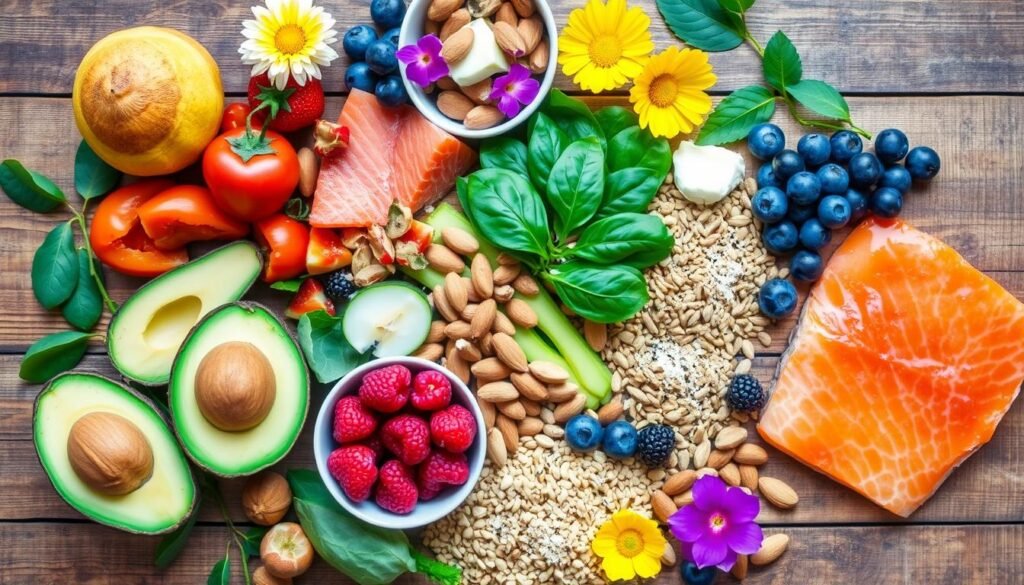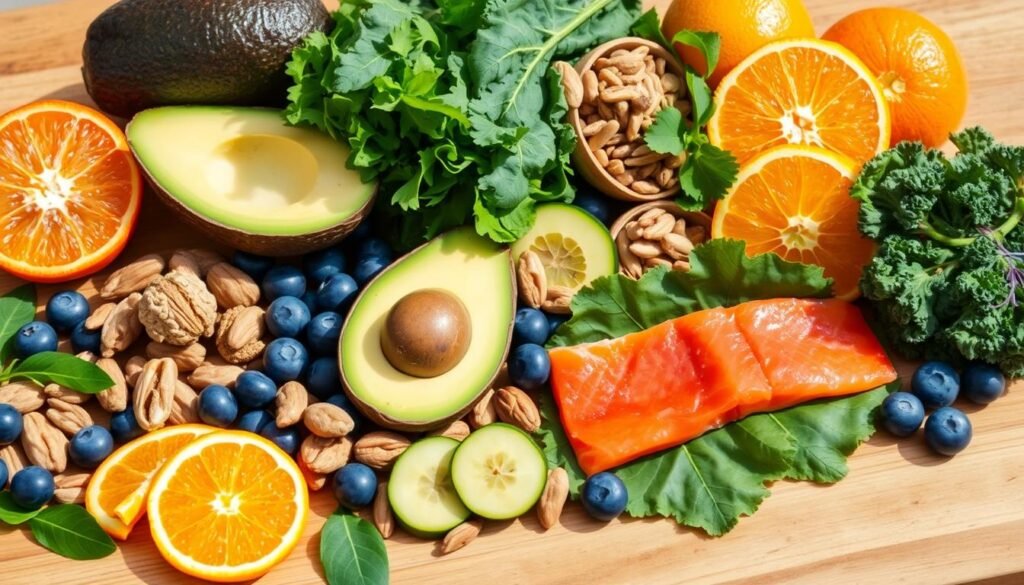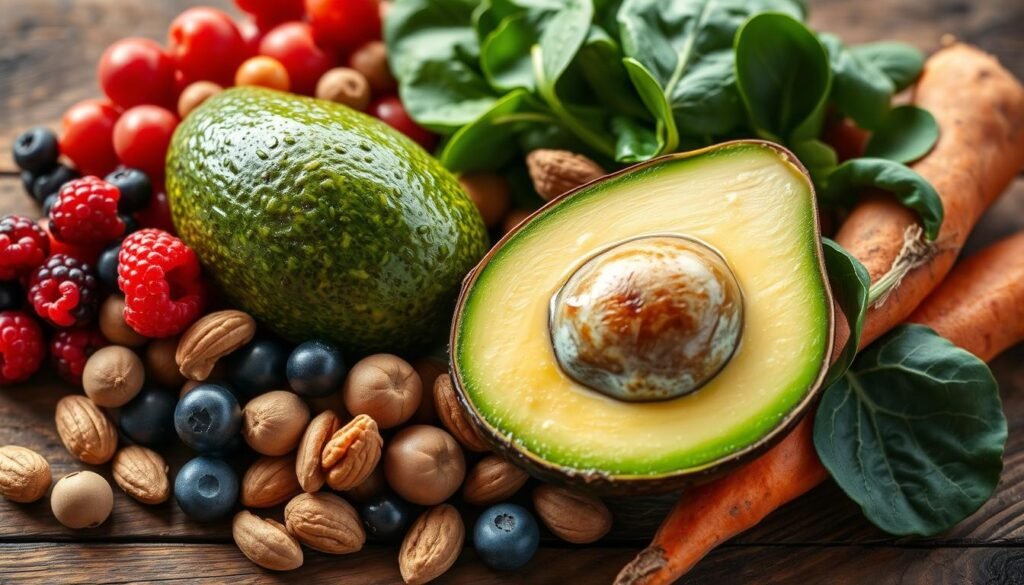Did you know nearly 30% of women see their hair thin by the time they are 30? This fact shows us how crucial nutrition is alongside genetics for hair health. Eating the right foods can boost hair strength and shine. These nutrients work together to fight breakage and make hair look alive.
A study in the Journal of Dermatology points out how diet affects our hair. It found that proteins, vitamins, and minerals are key to feeding our hair. Knowing this helps us choose foods that turn dull hair into vibrant, strong locks. Let’s dive into what foods are best for healthy hair and why they work wonders.
Key Takeaways
- Nearly 30% of women face hair loss by age 30.
- Nutrition plays a crucial role in hair strength and growth.
- The right hair health foods can improve hair vitality.
- Protein, vitamins, and minerals are essential for strong hair.
- A balanced diet can help prevent hair breakage.
Understanding Hair Structure and Growth
To eat well for your hair, it’s key to know about hair structure and hair growth. Hair has three main parts: the cuticle, cortex, and medulla. The outer layer is the cuticle which protects your hair. The cortex gives your hair strength and stretch. It has most of the hair’s build.
The medulla, at the hair’s heart, is scarce in thin hair. Hair is mostly keratin, a strong protein. Good nutrition is vital for making keratin. Your hair’s health depends on the right mix of protein, vitamins, and minerals.
Hair grows in three stages:
- Anagen Phase: Hair is actively growing for up to several years.
- Catagen Phase: Growth slows as the hair follicle shrinks.
- Telogen Phase: Hair rests then sheds over weeks or months.
Many things affect how hair grows and its loss. Genes, hormone changes, and the environment matter a lot. Knowing these helps us take care of our hair better.
| Phase | Description | Duration |
|---|---|---|
| Anagen | Active growth phase | 2-7 years |
| Catagen | Transitional phase | 2-3 weeks |
| Telogen | Resting phase | 3 months |
The Role of Nutrition in Hair Health
Nutrition plays a key role in keeping our hair healthy and strong. Studies have shown that not getting enough hair health nutrients can lead to weak hair growth and even hair loss. What we eat every day affects how our hair looks and feels.
Vitamins like A, B, C, D, and E are crucial for hair. An article from the Journal of Clinical Dermatology shows how important these vitamins are. They help get more blood to the scalp and make hair follicles stronger. This can make hair more durable.
Minerals, including zinc and biotin, are also important for hair health. Eating foods with these hair health nutrients supports better hair growth. However, too much vitamin A can be bad for your hair.

Eating a balanced diet is also key to preventing hair loss. Good nutrition makes a big difference in having healthy hair. This shows just how much what you eat can affect your hair’s health.
| Nutrient | Role in Hair Health | Sources |
|---|---|---|
| Vitamin A | Supports sebum production and enhances scalp health | Carrots, spinach, sweet potatoes |
| Biotin | Promotes stronger hair and reduces hair thinning | Eggs, almonds, whole grains |
| Zinc | Helps in cellular repair and contributes to hair tissue growth | Shellfish, legumes, seeds |
| Vitamin D | Encourages hair follicle cycling | Fatty fish, fortified foods, sunlight exposure |
| Iron | Improves blood circulation to hair roots | Red meat, lentils, quinoa |
Top Foods for Hair Growth
Nourishing the hair from within is key. Protein and iron are vital for hair health. Including the right foods in your diet can make your hair strong and healthy.
Protein-Rich Foods for Strong Hair
Protein helps grow healthy hair. It is used to make keratin, which is what hair is made of. Adding hair strengthening foods such as eggs, chicken, fish, legumes, and nuts into your meals can improve hair health. These are top choices for getting enough protein.
Iron Sources for Improved Circulation
Iron is crucial for hair health too. It makes sure your scalp gets enough blood flow. This helps nutrients reach your hair roots. Iron-rich foods like spinach, lentils, red meat, and cereals are good. Eating vitamin C with iron foods helps your body absorb iron better. To learn more about what your hair needs, visit this resource.
Foods that Promote Hair Health
To truly understand how nutrition influences hair vitality, we should focus on key nutrients. A, C, D, E, and B-vitamins like biotin are crucial for nurturing hair and promoting its growth. By including these vitamins in everyday meals, you can greatly improve your hair health.
Vitamins and Minerals Essential for Hair
Many foods, including leafy greens, eggs, and nuts, are packed with vitamins beneficial for hair. They also provide minerals for hair growth and help maintain a healthy scalp. Additionally, zinc and selenium keep hair strong and resilient. Adding these nutrients to your diet can fight hair damage effectively.
Antioxidant-Rich Foods to Combat Damage
Protecting hair from oxidative stress is also vital. Antioxidant-rich foods play a key role here. Berries, nuts, and green vegetables are loaded with antioxidant foods for hair. These foods counteract free radicals, supporting more vibrant hair. For tips on diet and hair, visit foods for healthier hair and learn about unhealthy foods that affect hair.

| Vitamin/Mineral | Source | Benefits for Hair |
|---|---|---|
| Vitamin A | Carrots, Sweet Potatoes | Helps produce sebum for scalp health |
| Vitamin C | Oranges, Strawberries | Boosts collagen production for strength |
| Vitamin D | Fatty Fish, Fortified Foods | Supports hair follicle cycling |
| Biotin (B7) | Eggs, Nuts | Promotes hair growth and thickness |
| Zinc | Meat, Shellfish | Maintains oil glands and hair follicle health |
| Selenium | Brazil Nuts, Seafood | Reduces oxidative stress on hair |
Hydration and Its Impact on Hair Health
Staying hydrated is key to good health and that includes your hair. Drinking enough water balances moisture in your hair. This avoids dryness and brittleness, which can damage hair.
Hydrated hair is better at taking in nutrients that are necessary for growth. This means your hair can grow healthy and strong.
Being well-hydrated helps your body deliver important vitamins to your hair. Vitamins like A, C, D, and E, including biotin, are crucial. Not drinking enough water can leave your hair dull.
To keep your hydration level up, drink at least eight glasses of water a day. Eating foods high in water can also help.
Adding foods like cucumbers, watermelon, and oranges can boost your hydration. These foods help in keeping your hair vibrant and strong. You’ll see your hair improve in texture and growth.
| Food | % Water Content | Key Nutrients |
|---|---|---|
| Cucumbers | 95% | Vitamins K, C, Potassium |
| Watermelon | 92% | Vitamins A, C, Magnesium |
| Oranges | 86% | Vitamins C, B, Potassium |
Hair-Boosting Superfoods to Include in Your Diet
Eating superfoods for hair health can make a big difference in hair vitality. These foods are full of vitamins, minerals, and essential fats. They are key for strong hair growth. Here are some of the top foods to eat for better hair.

- Sweet Potatoes: Rich in beta-carotene, which turns into vitamin A, sweet potatoes help make hair moisturized by boosting sebum production.
- Avocados: Packed with healthy fats, avocados offer nutrients that help keep the scalp healthy and make hair elastic.
- Chia Seeds: Small but mighty, chia seeds have omega-3 fatty acids and antioxidants. They help make hair strands stronger and reduce hair loss.
- Fatty Fish: Salmon and mackerel, loaded with omega-3 fatty acids, are great for feeding hair follicles and promoting growth.
These superfoods bring a range of benefits for your hair, making them easy to include in your diet. Focusing on their nutrients can change your hair health for the better.
Avoiding Foods That Harm Hair Health
Maintaining vibrant and healthy hair takes more than just eating right. It also means avoiding certain harmful foods for hair. Foods high in sugars and saturated fats can damage your hair. They can make it thin, dull, and lead to hair loss. Processed foods trigger inflammation in the body which is bad for your hair.
Drinking too much alcohol can harm your hair by dehydrating your body. Too much caffeine can mess up your sleep. This stress might cause you to lose hair. Knowing which dietary pitfalls for hair health to avoid is key for healthy hair growth.
Some common foods to avoid include:
- Sugary snacks and beverages
- Fast food items high in saturated fats
- Highly processed foods with artificial ingredients
Adding foods that prevent hair loss to your diet while cutting out bad ones helps a lot. Changing what you eat provides nutrients needed for strong, healthy hair.
| Food Type | Effects on Hair Health |
|---|---|
| Sugary Foods | Can lead to hair thinning and lose of shine |
| Saturated Fats | May cause inflammation and weaker hair |
| Processed Ingredients | Can upset hormone levels and harm hair |
| Alcohol | Leads to dry, brittle hair |
| Caffeine | Might disrupt sleep and increase stress |
Being aware of these food choices helps promote a healthy environment for hair to grow and flourish.
Creating a Balanced Diet for Healthy Hair
For vibrant and healthy hair, start with what you eat. Your diet should have all the essential nutrients for hair to grow and stay strong. Include many different foods that nourish both your body and hair.
To keep your hair happy, you need to eat well. This means adding:
- Protein: It’s key for hair structure. Lean meats, eggs, legumes, and nuts are great for boosting protein.
- Vitamins: Vitamins A, C, D, and E are good for the scalp. Get them from fruits and veggies.
- Minerals: For strong hair growth, iron, zinc, and selenium are must-haves. Spinach, lentils, and shellfish are loaded with these.
- Healthy Fats: Omega-3 acids make hair elastic and shiny. Find them in fish, seeds, and avocados.
Plan your meals weekly to focus on these nutrients. This will help you enjoy a variety of meals. Such planning benefits not just your hair but your overall health too.
Moderation and variety are key. By adjusting your routine to fit your needs, you’ll make a lasting plan for hair health. Customizing your food choices can improve your hair’s texture and strength in noticeable ways.
| Nutrient | Food Sources | Benefits for Hair |
|---|---|---|
| Protein | Eggs, Chicken, Quinoa | Builds strong hair structure |
| Iron | Spinach, Lentils, Red Meat | Improves circulation to the scalp |
| Omega-3 Fatty Acids | Salmon, Walnuts, Chia Seeds | Enhances shine and elasticity |
| Vitamins A, C, D, E | Carrots, Oranges, Fatty Fish | Promotes healthy scalp |
| Zinc | Nuts, Seeds, Whole Grains | Supports hair growth and repair |
Conclusion
When it comes to hair health, eating right is key. A balanced diet is crucial for shiny, strong hair. To boost hair strength and growth, eat plenty of protein, iron, vitamins, and antioxidants. Foods like lean meats, spinach, and berries are packed with the nutrients your hair needs to thrive.
It’s also important to know what foods to avoid for healthy hair. Stay clear of too much sugar and bad fats. These can hurt your hair’s health. By avoiding these, your hair can become stronger and more resilient.
To really bring out the best in your hair, focus on nourishing your body. Eating foods that are good for your hair is a sure way to get a radiant, strong mane. With the right diet, you can enjoy gorgeous hair for a long time.